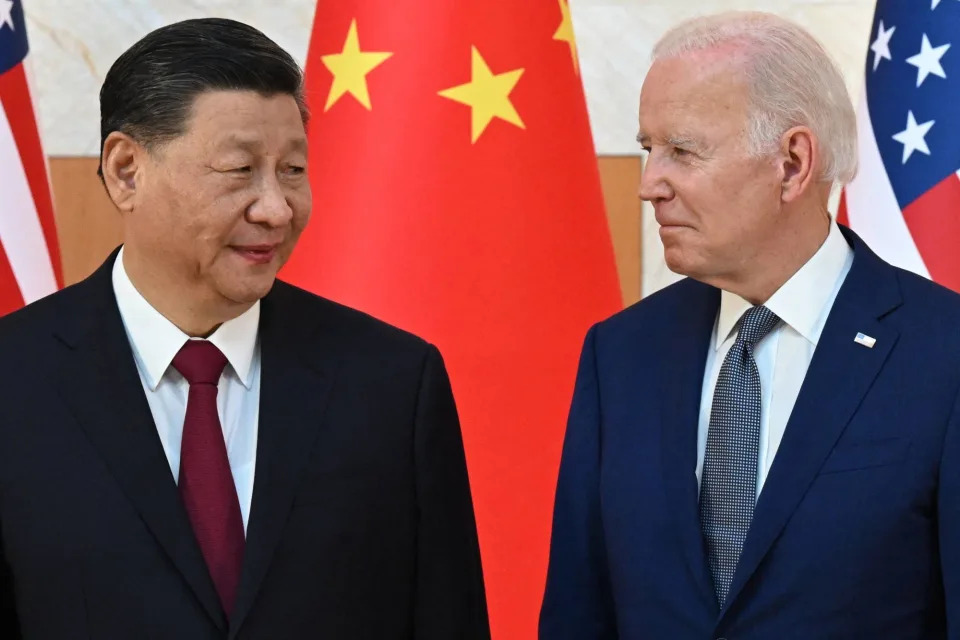China's closer ties with Russia risk crossing a line as sensitive to Washington as Taiwan is to Beijing, a senior member of US President Joe Biden's administration suggested on Tuesday.
Asked about Chinese President Xi Jinping's meeting with Russian Foreign Minister Sergey Lavrov earlier in the day, deputy secretary of state Kurt Campbell first cited the "red line" and "core interest" that his department's officials often hear about from Chinese counterparts.
"For the United States ... our most important mission, historically, has been the maintenance of peace and stability in Europe," Campbell said. "The point that we're trying to make to Chinese interlocutors is that this is our strategic interest. This is the most central issue, and China is involving themselves in a way that they think that we don't completely understand."
Assurances that Washington does not support independence for the self-ruled island are a regular fixture in high-level dialogue with Beijing. In his first meeting with Biden after the US leader entered the White House in 2021, Xi labelled the "Taiwan issue" the "first red line that must not be crossed" in bilateral relations.
Beijing sees Taiwan as a part of China that will eventually be reunited, by force if necessary. Most countries, including the US, do not recognise Taiwan as an independent state, but Washington opposes any attempt to take the island by force and remains committed to supplying it with weapons.
While Beijing considers Taiwan part of its territory and the US does not consider the island a sovereign state, Ukraine is a sovereign state that was invaded by Russia in February 2022.
Campbell, who was speaking during a discussion with Stephen Orlins, president of the New York-based National Committee on US-China Relations, said Beijing had decided "to provide the necessary wherewithal in terms of machine tools, joint use capabilities, a whole variety of capacities to basically allow Russia to retool".
He said his team had "told China directly if this continues, it will have an impact on the US-China relationship".
The Beijing-Moscow relationship appeared tighter on Tuesday after Lavrov met Xi to jointly condemn Western-led "bloc confrontation" and "promote reform" in the global system.
"We will not sit by and say everything is fine, for instance, if Russia's offences continue and they gain territory in Ukraine, that will alter the balance of power in Europe in ways that are, frankly, unacceptable from our perspective," Campbell added.
Last week, Campbell cited China's closer relations with Russia as part of the Biden administration's rationale for a stronger alliance with Japan and the Philippines, whose leaders will meet the US president for formal talks in Washington this week.
Campbell's comments come amid a series of high-level bilateral engagements in which both sides are confronting each other on thorny issues that appear difficult to resolve.
Those include US restrictions on sales of advanced technology to China. Last week's call between Chinese President Xi and Biden highlighted contention over a series of moves that Biden has made to block Chinese firms from buying the most advanced semiconductor chips and receiving investment from US firms to develop cutting-edge technology such as artificial intelligence.
Far from signalling greater understanding on the issue, Beijing's post-call readout characterised these restrictions as "an endless stream of measures to suppress China's economy, trade, science and technology".
Days later, US Treasury Secretary Janet Yellen said during discussions in Beijing with Chinese Vice-Premier He Lifeng that excessive Chinese exports could undercut American interests and lead to "global spillovers".

Chinese President Xi Jinping and US President Joe Biden, shown during a G20 session on November 14, 2022, spoke last week but apparently failed to resolve any major issues.
In a response to the talks from state news agency Xinhua, Beijing said it had responded fully "to the production capacity issue" and expressed "serious concerns" about US trade restrictions against China.
While not central to her discussions with Vice-Premier He, Yellen also had a message about Beijing's economic engagement with Russia, warning of "significant consequences" if Chinese companies provided material support for Russia's invasion of Ukraine.
In remarks to reporters after the meeting, she said China had assured her it would not do so and did not want this to be a bilateral issue, according to Reuters.
Still, Campbell said recent high-level dialogues with China - including an "upcoming" visit to Beijing by Secretary of State Antony Blinken - indicated that the Chinese government was "determined to keep US-China relations on a steady, stable path".
"I think we are now back to a situation in which the lines of communication are almost fully open," he added. "What we're still seeking ... is more engagement on the military and operational side and I think the Chinese system is ready to take those steps, and we're ready to meet them halfway and in keeping those lines of communications open."


